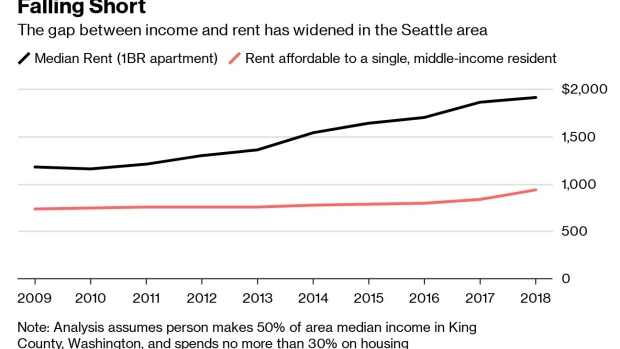Jun 18, 2019
Seattle's Latest Answer to Its Housing Shortage: Crowdfunding
, Bloomberg News

(Bloomberg) -- Seattle has struggled to respond to an affordable housing crisis fueled by its booming tech scene. Now it’s turning to techies to help solve the problem.
On Tuesday evening, the city’s largest nonprofit affordable housing provider, Bellwether Housing, is hosting an event inside the spheres at Amazon.com Inc.’s headquarters to kick off a $4.5 million fundraising campaign. The organization expects a sizable chunk of that to come from tech workers contributing no more than a few thousand dollars each.
The money will help Bellwether build 750 new apartments with below-market rents at four sites in the city and a nearby suburb over the next three years that it will own and operate. About a third will be aimed at families, with two to four bedrooms, and all will be near public transit, for easier access to jobs.
Crowdfunding affordable housing is the latest twist in a long-simmering debate about what tech companies and their employees should do about a problem that they’re often blamed for in the nation’s booming tech hubs. And it shows the innovative strategies developers are having to try in the face of inadequate government help.
The idea for the campaign began about a year and a half ago when an advocacy organization called Tech 4 Housing approached Bellwether. The nonprofit had previously raised funding from accredited “impact” investors to supplement money it got from government and philanthropy. But a change in securities rules meant that it was now possible to raise cash from contributors of lesser means.
“It seemed like such a partial solution in my mind to say only very wealthy people” can invest in this cause, said Ethan Goodman, the founder and executive director of Tech 4 Housing, and a former Facebook Inc. employee. “When crowdfunding became a legal form of investment a few years ago, it seemed like a really good fit.”
Modest Return
Investors in Bellwether’s new fund will get a modest 2% return annually. The vehicle is designed to last for 15 years, with opt-outs every five. That will provide the nonprofit with a stable, low-cost source of capital that it can use to accelerate its work at a time when demand for units is far outstripping supply.
“The public resources just weren’t keeping up” with the need, said Susan Boyd, Bellwether’s chief executive officer, citing a decades-long retreat of the federal government from housing assistance and a recent decrease in the value of tax credits that organizations like hers use to fund projects. Everyone who works on the issue is “trying to figure out ways to move faster, so we have a bigger impact.”
A study by McKinsey & Co. last year showed that Seattle needed to double its outlay to as much as $410 million to plug a 14,000-unit housing gap needed to shelter all the city’s homeless. But even more resources would be needed to build housing affordable to teachers, nurses, police officers and other middle-income residents, whose pocketbooks are increasingly being strained by sky-high rents.
The median value of a single-family home in Seattle soared 63 percent over the past five years, according to Zillow data. Median rents were up 27 percent to $2,519 a month over the same time period.
Both Goodman and Boyd are quick to say that crowdfunding is no substitute for broader public investment in affordable housing. But they see their effort as a way to draw a wealthy constituency into the issue and get people to tune into a growing civic crisis.
“I see it as a community-building tool as well as a financial tool,” said Goodman.
Personal Investment
For Spencer Visick, a software developer at Redfin Corp., investing in the fund was an easy sell. He moved to the Seattle area in 2006 and worked for several years at Amazon, benefiting from stock compensation as the tech giant’s shares climbed. In recent years, he’s been troubled by how soaring rents have made it harder for some of his neighbors to afford living in the city. So, he’s decided to contribute $10,000 to Bellwether’s fund.
“Investing in this is a thing I can believe in, even if it doesn’t have the same return as Amazon” stock, he said. “It feels a lot better than when I open up the paper and read about Amazon selling facial-recognition technology to law enforcement.”
The crowdfunding effort is just one approach to a problem that’s being addressed on several fronts in the Seattle area. In January, Microsoft Corp., which has its headquarters in a Seattle suburb, pledged $500 million to the issue. Washington state recently boosted its allocation to a housing trust fund, which is used to preserve and create affordable units.
Meanwhile, Amazon and other area businesses have stepped up their philanthropy on the issue after beating back a tax last year that would have raised money from large employers to fund homeless services. As part of its most-recent pledge, Amazon will match up to $5 million in employee contributions to 20 area nonprofits that work on housing and homelessness, including Bellwether.
In a way, the crowdfunding effort harks back to the roots of affordable housing, said Matthew Gordon Lasner, an associate professor of urban studies and planning at Hunter College in New York. In the 19th century, he said, robber barons and other wealthy individuals financed nonprofits that built housing for low-income people in Britain, New York and elsewhere in exchange for below-market returns.
“Here we are in the new Gilded Age,” back to leaning on private citizens and companies to do the job of government, Lasner said. “I wouldn’t be surprised to see more of this happening nationally.”
To contact the reporter on this story: Noah Buhayar in Seattle at nbuhayar@bloomberg.net
To contact the editors responsible for this story: Debarati Roy at droy5@bloomberg.net, Rob Urban, Christine Maurus
©2019 Bloomberg L.P.





